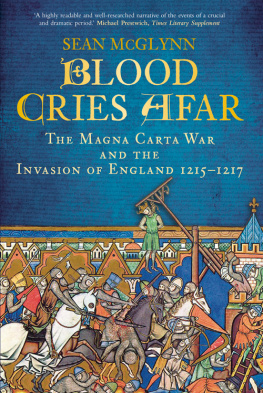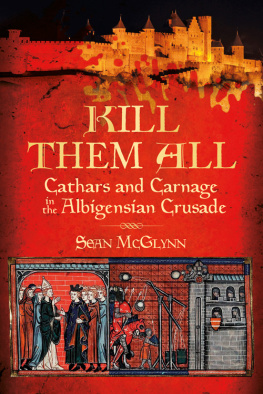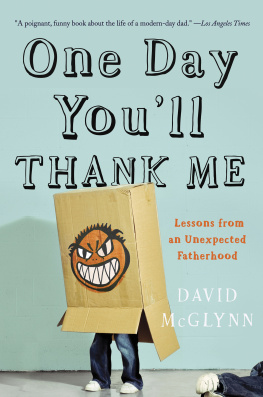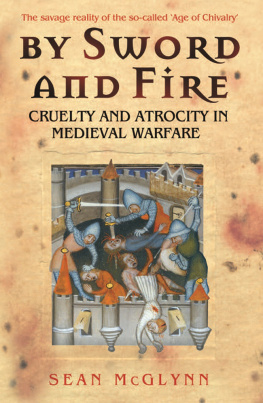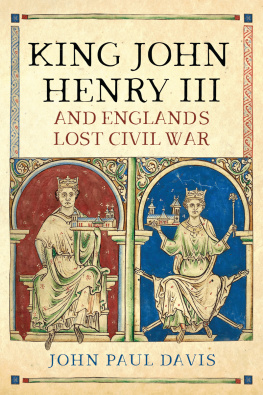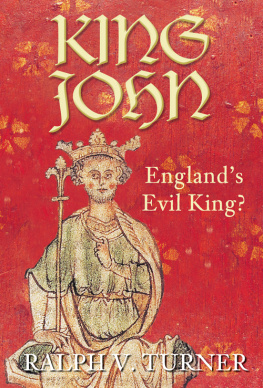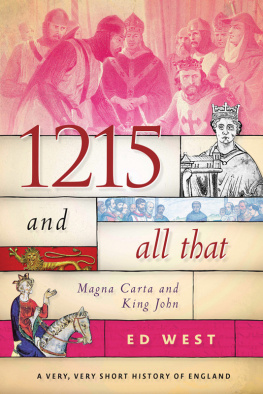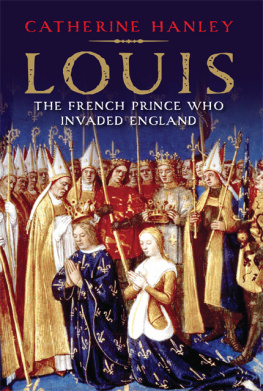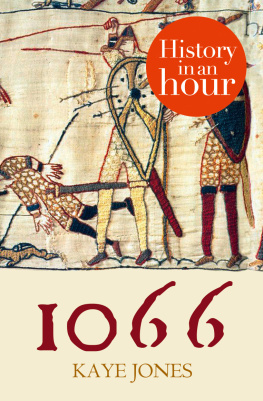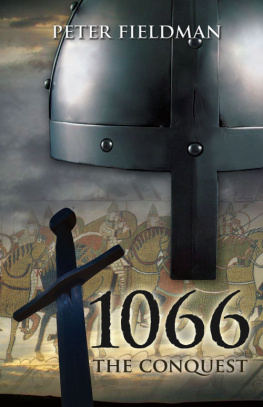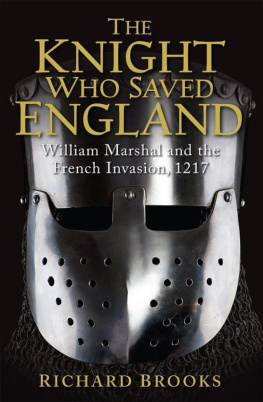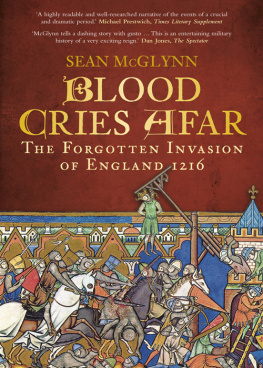
For Marie
T his book has been a long time in the making. Whether it has been Bismarcks events being stronger than the plans of men or P.G.Wodehouses Fate lurking around the corner with a piece of lead piping in its hand, circumstances have meant that I have left people waiting. I am painfully aware of this. My apologies to them all. That I did finish the book is in no small part due to a generous grant from the Society of Authors which came at a particularly crucial time; I am delighted to express my gratitude and appreciation to the Society.
In my first book I acknowledged my teachers over the years and medievalists who kindly invited me to speak at seminars and conferences. Here I should like to make mention again of Peter Coss for his understanding and learned insights and John Gillingham, whose work continues to be influential on my own. I would also like to thank Chris Harper-Bill: it was as an undergraduate in one of his lectures that I first learned of the little-known invasion of 1216 and became fascinated by it. I am very grateful to those scholars who, often a very long time ago now, have been gracious enough to provide me with unpublished papers of talks and advanced copies of articles relevant to this book. Tony Moore has been very kind in this respect. I have also benefited from Louise Wilkinsons research, and I am thankful to David Carpenter for directing her work my way. John Gillingham and Alexander Grant have also forwarded papers and useful comments. Special mention must go to Keith Stringer, whose work on the Scottish angle has been such a great help, and to the generosity of David Crouch and Stewart Gregory for an advanced look at their work on the wonderful new edition of The History of William Marshal ; David Crouchs notes have proved invaluable. I have also benefited from a correspondence on national identity with the late Henry Loyn. My sincere apologies if I have unintentionally omitted others: as I say, it has been a long time. Looking ahead, I owe thanks to John France for directing me towards my next project.
In the work environment, I would like to pay tribute to past colleagues for their help and support: Joe Martin, Jo Sharrock, Dave Bates and Steve Ryan in Bristol; Lara Price in Bath; and Jackie Duff at the Open University. And the same gratitude of course extends to my current colleagues who make my place of work so enjoyable: Andy Pickering, Stephen Page, Katherine Dray and Eddie Daughton. The students have been and are a delight to teach. At The History Press, Shaun Barrington has been an ideal editor to work with.
On the personal front, I still owe much to some wonderful friends acknowledged in my previous book: Robert Purves (always welcome on these shores); Steven Forrow (I have forgiven you almost for leaving London); Dr Anthony Cross (who, when not immured in the ivory towers of Oxford University, is encouraging me onwards in Bath); and the stalwart Stephen Gui Rigby (with whom I put the world right and laugh at the folly of it all). New mentions this time around are: James, Meinir and (my goddaughter) Olwen Ottaway; Neil Trodden, whose detective work ensured we re-established contact; Michael Owen, who keeps me in touch with developments in the modern world; and my learned friend Glenn Renshaw, with whom over the years I have shared many hours of illuminating and productive debate on matters historical, social, cultural and political.
On the family front my thanks go to Liz, Dave, Josh, Jamie and Erin, not least for doing such a great job in looking after Mum. My mother remains a constant source of support, help and friendship and I will always be grateful to her. Sam, Maddy and Jenny have shown great humour, patience and understanding during my endeavours and at my being shut away in the study; you remain inspirational and the next one is for you. Finally, my love and thanks to Marie: even greater than her considerable assistance in helping with the translations of the Old French sources has been her practical help and support that have allowed me time and space to write. Her courage and resolve in overcoming serious adversity is remarkable and demonstrates that bravery is not merely present on the battlefield. This book is dedicated to her.
C ONTENTS
Introduction |
|
|
|
|
|
|
|
|
Appendix 1 |
Appendix 2 |
Appendix 3 |
Appendix 4 |
Appendix 5 |
AB | Anonymous of Bthune, Histoire des Ducs de Normandie et des Rois dAngleterre , ed. F. Michelet, Paris, 1840 |
AM | Annales Monastici , ed. H.R. Luard, Rolls Series, 186469 |
ANS | Brown, R.A. et al. (eds), Anglo-Norman Studies [formerly Proceedings of the Battle Conference ], 1979 |
ANW | Strickland, M. (ed), Anglo-Norman Warfare: Studies in Late Anglo-Saxon and Anglo-Norman Military Organization and Warfare , Woodbridge, 1992 |
BC | Barnwell Chronicler, Memoriale Walteri de Coventria , ed. W. Stubbs, 2 vols, RS, 187980 |
EHR | English Historical Review |
HWM | History of William Marshal , ed. A. Holden, D. Crouch and S. Gregory, Anglo-Norman Text Society, 20022006 |
JMMH | Journal of Medieval Military History , eds B, Bachrach, C.J. Rogers and K. de Vries, Woodbridge, 2002 |
MGH SS | Monumenta Germaniae Historica. Scriptores |
MP | Mathew Paris, Matthei Parisiensis, Monachi Sanctii Albani, Chronica Majora , ed. H.R. Luard, RS, 18849 |
OEMW | Rogers, C.J. (ed), Oxford Enclyclopedia of Medieval Warfare and Military Technology , Oxford, 2010 |
RC | Ralph of Coggeshall, Radulphi de Coggeshall Chronicon Anglicanum , ed. J. Stevenson, RS, 1875 |
Recueil | Recueil des Historiens des Gaules et de la France , Paris, 17341904 |
Rigord | Rigord, Oeuvres de Rigord et de Guillaume le Breton , ed. H.F. Delaborde, Paris, i, 1882 |
RS | Rolls Series |
RW | Roger of Wendover, Rogeri de Wendover Liber Qui Dicitur Flores Historiarum [ The Flowers of History ], ed. H.G. Hewlett, RS, 18867 |
TCE | Coss, P. and Lloyd, S. (eds), Thirteenth Century England , Woodbridge, 1985 |
WB i | William the Breton, Gesta Philippi Augusti in Oeuvres de Rigord et de Guillaume le Breton , ed. H.F. Delaborde, Paris, 1882 |
WB ii | William the Breton, Philippidos , in Oeuvres de Rigord et de Guillaume le Breton , ed. H.F. Delaborde, Paris, 1882 |
I NTRODUCTION
W ar, as defined by Clausewitz, is an act of violence intended to compel our opponent to fulfil our will. This will is usually a political objective, hence Clausewitzs more famous, but also more controversial, dictum that War is nothing but the continuation of politics, with a mixture of other means. He amplifies this verdict in the clarification: War is not merely a political act, but also a real political instrument, a continuation of political commerce, a carrying out of the same by other means. This is better known to us rendered as War is the continuation of politics by other means. Although not all conflicts can or should be explained in such terms (some arising from emotional and irrational origins), this interpretation is basically sound and judicious; it is particularly apposite to the Middle Ages. Beyond the political objectives, we must also unearth the financial ones: these are rarely buried deeply but are frequently obscured by the noble ideals and moral justifications proclaimed by the warring protagonists. Politics means power means money. It is only rarely dangerous that too much cynicism is harmful to the process of historical interpretation; it is usually the case that the more cynical one is the closer one arrives at the historical truth. As I am forever telling my students, to really understand History you have to pick up the stone and see what is crawling underneath. As this book deals with warriors and not saints, it will adopt such an approach; but if these pages contain very few altruists, they do contain many brave men performing heroic acts in pursuit of their masters objectives, however questionable their causes or motivations.
Next page
